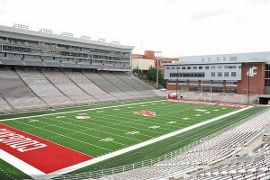|
After 13 years of home-away-from-home games in Seattle, Washington State Cougars athletic director Bill Moos is pulling the plug on the Cougars' almost-yearly trek over the Cascade Mountains.  Thursday's season-opener against Rutgers at CenturyLink Field will serve as the 12th and final installment of what WSU fans have known simply as The Seattle Game since 2002. Thursday's season-opener against Rutgers at CenturyLink Field will serve as the 12th and final installment of what WSU fans have known simply as The Seattle Game since 2002.
"We're going to discontinue it," Moos said. "Really feel that it's run its course -- served us well over the years." When the tradition started, it was seen as a way to bring the team closer to a significant number of its fans. Western Washington -- and the Seattle area in particular -- is home to a majority of WSU's alumni base and there was a vocal faction of that group that had long lobbied for a game closer to home. When the Seattle Seahawks opened what was known then as Seahawks Stadium in 2002, the timing made sense. WSU, ranked No. 11 in the preseason AP poll, beat Nevada 31-7 before a near-sellout crowd of 63,588 in the first football game played at what is now reputed as the loudest venue in the NFL. The game was widely accepted as an overwhelming success. Over the first eight years, WSU continued to bring in out-of-conference opponents, but interest started to dwindle as the program failed to maintain the success it found early in the decade. The game still regularly drew 45,000-plus -- approximately 10,000 more than Martin Stadium's capacity -- but many believed giving up the distinct home-field advantage in Pullman was no longer worth it. When Moos arrived in the spring of 2010, there wasn't a Seattle game waiting on the schedule. "When I got to Washington State, I sat down and developed our blueprint that we wanted to follow to move our program in the direction to be successful," Moos said. "We had all kinds of things we wanted to accomplish, but we didn't have any [major] revenue streams." He saw returning to Seattle in 2011 as one way to change that -- and added a twist. No longer would the Cougars play an early-season nonconference game in Seattle, instead Moos scheduled midseason conference games against Oregon and Oregon State. He knew that by playing the Oregon schools there, WSU was essentially forfeiting home games, but the price was right and WSU needed the money. Plus, the location wasn't going to affect the outcome considering how bad the Cougars were at the time. "The money we made playing Oregon in 2012 [when the attendance was 60,929] was roughly twice the net revenue that we would have made playing at home in front of a packed house in Martin Stadium," Moos said. "It served its purpose -- it generated funds for us and kind of kick-started what our plans were." As things progressed, other revenue streams developed. Thanks to network television contracts and the debut of the Pac-12 Network, money was no longer as tight. "We were able to invest the extra monies that we were realizing from [the Seattle games and TV contracts] to help build $130 million worth of facilities for the football program and Martin Stadium," Moos said. "We've got enthusiasm now. We've got energy. I think we've done a good job of creating exposure in the western side of the state -- which we'll continue to do -- we’re just not going to bring a football game over anymore. "It just felt like it was time to bring everything home." When the Cougars play their Pullman-opener on Sept. 13 against Portland State, fans will be greeted by a finished product. In the spring, construction was completed on a $61 million football operations building which encloses the west end zone, and more recently a new brick finish at the base of the stands surrounding the field was installed along with a ribbon board for messaging atop the north stands. "It certainly isn't the largest stadium, but I think it's one of the nicest and really I think is inviting and complements our campus," Moos said. Moos has told other schools Seattle is no longer on the table for a potential home-and-home series. He turned down an offer from Oklahoma State -- OSU played in Seattle in 2008 and WSU went to Stillwater in 2010 -- because the Cowboys were only interested if the WSU home game was again in Seattle. Largely as a result of the game being played on a Thursday this year, the final Seattle game will also be the least attended. "I think I'd be happy if we have 30,000 with what the numbers are now," Moos said. As part of the home-and-home contract that will also send WSU to New Jersey next year, Rutgers would only commit to a weekday road game, citing travel concerns. Moos said WSU wanted to play Rutgers in Pullman on a Saturday and play the Seattle game midseason, like the past few years, but it just didn't work out. He acknowledged that a Thursday night game in Seattle is less than ideal -- primarily because it'll prevent students, who have begun classes, from attending -- but thought playing on the first big night of college football on national television was a decent-enough consolation.
|
